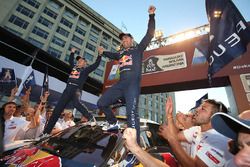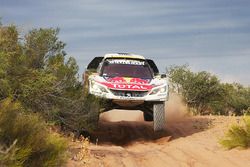Dakar could mandate 4WD turbo petrol cars from 2019
The Dakar Rally could require its leading manufacturers to switch to four-wheel-drive entries with turbocharged petrol engines from 2019 onwards.

Photo by: Red Bull Content Pool













A roadmap for the future of cross-country rallying was agreed in a late-2016 strategic meeting between the FIA and representatives from rally-raid's leading manufacturers – X-Raid Mini, Peugeot and Toyota Overdrive.
The new FIA ruleset would apply to the revamped cross-country world championship that is reportedly being planned, but it is not fully clear what effect it would have on the Dakar.
Cross-country rallying's marquee event is run by the ASO, and even though the event organisers try to broadly follow FIA regulations, their actions are likely be determined by the effect any regulation tweaks would have on the quality of competition and the number of participants.
The new FIA ruleset will mean changes for all three brands involved at the highest level of cross-country rallying, provided they continue their participation.
Peugeot dominated the two most recent editions of the Dakar with its rear-wheel drive buggy, which uses a turbocharged diesel engine – as does X-Raid's 4WD Mini John Cooper Works machine.
Toyota, meanwhile, has recently competed with a normally-aspirated petrol engine in its four-wheel drive Hilux, but has also been developing a two-wheel drive 'Evo' version of the car.
“This way there will be a performance balance that's easier to manage for all,” said Toyota Overdrive team manager Jean Marc Fortin.
“The project is an FIA [cross-country] world championship, after several years as a 'world cup', to begin in 2018. The priority drivers will only be able to drive 4WD cars. The 2WD buggies will still be competing, although they will have to have the same engine [as 4WD]."
The “priority drivers” referred to by Fortin are a specially-designated category for leading entrants, who qualify either based on standout world championship results or are given the status by the FIA.
Fortin continued: "It will be 4WD cars with petrol engines. Cross-country was the only confusing FIA category in terms of regulations. These decisions, with which we all agree on without exception, should simplify the situation.
“We have all agreed and the FIA, fortunately, is happy that we have been able to make a decision that pleases us all. Therefore we have their blessing.”
The Peugeot question mark
The switch in regulations raises questions over Peugeot's continued involvement in cross-country rallying, as the French marque has devoted considerable resources into developing its two-wheel turbo diesel-engined challenger and turning it into a world-beater.
According to the rival Toyota camp, the rear-wheel drive of the 2017-spec 3008DKR, combined with the turbocharged diesel power unit, created a major advantage for Peugeot in the most recent edition of the Dakar Rally, especially at high altitude.
While Peugeot has yet to announce its programme for the 2018 Dakar, drivers Stephane Peterhansel and Sebastien Loeb both dropped strong hints they would be back – the former stressing that the 2018 race would be of particular importance, as the Dakar will be celebrating its 40-year-anniversary.
However, as the rally-raid rule change will likely follow right after Dakar 2018 – in time for the start of that year's FIA Cross-Country Rally World Cup – Peugeot's future in the category is unclear for the seasons after.
When talking to Motorsport.com during the 2017 Dakar, Peugeot CEO Jean-Philippe Imparato said of his brand's continued involvement in the Dakar race: “When we decide one operation, we decide this operation for the next three years, medium-term plan.
"You cannot build this type of team, this type of technical skills, if you don't have a three-years plan as a minimum.
“But every year we reconsider our operation - we must have, first, a result; we must have as well a return on investment, so we will calculate our return on investment within two or three months.
"Because, as you know, all the budget that we invest in the operation is made and coming from the cars we sell in other countries."
He added: “At this point, I don't have any risk or doubt over the immediate future of this programme.”
Be part of Motorsport community
Join the conversationShare Or Save This Story
Subscribe and access Motorsport.com with your ad-blocker.
From Formula 1 to MotoGP we report straight from the paddock because we love our sport, just like you. In order to keep delivering our expert journalism, our website uses advertising. Still, we want to give you the opportunity to enjoy an ad-free and tracker-free website and to continue using your adblocker.











Top Comments